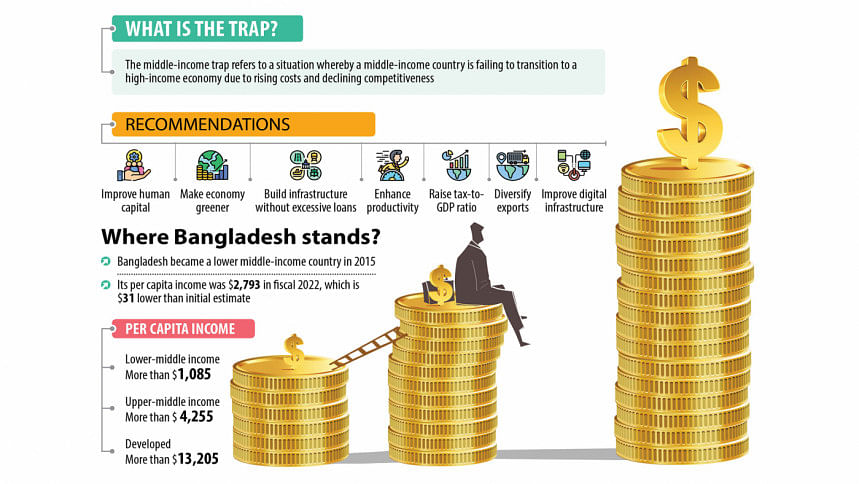Analysts warn of middle-income trap

Analysts have warned that Bangladesh may fall into the middle-income trap unless it takes measures to improve human capital, make the economy greener, build infrastructure without taking excessive loans and increase efficiency.
They also called for diversifying export products, raising the tax-to-GDP ratio and increasing investment to improve digital infrastructure.
The recommendations came at a seminar, "Advancing green growth and avoiding middle-income trap: Sharing Asian experience", organised by Asian Development Bank (ADB) in InterContinental Dhaka yesterday to celebrate 50 years of the ADB's engagement with Bangladesh.
The middle-income trap refers to prolonged low growth rates which are likely to be experienced by a country after it makes a rapid transition from low-income to middle-income status with the aid of cheap labour and export-driven economic models.
According to the World Bank's latest classification of countries, a country exceeding a per capita income of $1,085 is marked as a lower-middle-income country. Bangladesh graduated from that category in 2015.
The middle-income trap is a reality in the world as many countries fell into it while 21 countries managed to upgrade to upper-income status in the past three decades, said Bangladesh Bank Governor Abdur Rouf Talukder
If a country can exceed a per capita income of $4,255, it will be regarded as an upper-middle-income country. To be regarded as an upper-income country or a developed nation, the per capita income must exceed $13,205.
The middle-income trap is a reality in the world as many countries fell into it while 21 countries managed to upgrade to upper-income status in the past three decades, said Bangladesh Bank Governor Abdur Rouf Talukder.
Of the 21, 17 are either island states, city states or European countries while the rest are Chile, Uruguay, Oman and South Korea, he said.
Even India has been a low middle-income country for many years and Malaysia, Vietnam, and the Philippines have remained upper middle-income countries for over a decade, he said.
To avoid the trap, Talukder proposed promoting cottage, micro, small and medium enterprises which could create jobs for trained and non-trained people as well as for women.
"(They) also contribute to reduce disparity," he said.
The investment should be on diversified products so that dependency on one product, that is garments, can be reduced, he said, adding that light engineering, leather, jute, IT-enabled goods and services and agro-processing sectors have growth potential.
The BB governor also proposed enhancing productivity as economic growth currently was being driven by investment in factors of production and it would not be possible to sustain it for long.
So, skills development is necessary to enhance productivity, he said, adding that the government launched a "Skills for Employment Investment Program" financed by the ADB and National Skill Development Authority to raise the population's efficiency.
Addressing climate change is also necessary to avoid the trap and the ADB can help to take up project, especially those on increasing power generation from rooftop solar panels, he said.
Other propositions of the governor were to ensure financial inclusion so that small investors could get access to capital and to reduce non-performing loans and ghost borrowers, he added.
Bangladesh has to face some challenges if it wants to avoid the trap, said Kenichi Yokoyama, director general of the ADB's South Asia Department.
The prime one is climate change as the country incurs a huge amount of losses every year due to drought, flood, salinity and river erosion, he said.
Policy reforms are necessary to enhance climate resiliency and increase the tax to GDP ratio as it is still one of the lowest in the world, he said.
He proposed working on good governance and quality housing and public transport.
To avoid the trap, Bangladesh needs to ensure green growth and transition from medium to high human development, said Prof David Hulme, a specialist on inclusive development.
"The country needs more infrastructure surely but the government should be careful about planning and avoiding excessive debt," he said while presenting a keynote paper.
He also focused on reducing income inequality and labour exploitation and improving the quality of education and health.
Bangladesh is located in a place vulnerable to climate change, so the government is taking steps at its own cost, said Mohammad Tofazzel Hossain Miah, principal secretary to the prime minister.
The private sector is also active but Bangladesh needs more resources to make the economy greener and here international community should come forward, he said.
"We need affordable finance and the country will need $250 billion within 2050 for green activities so the development partners should contribute," he added.
Nihad Kabir, former president of the Metropolitan Chamber of Commerce and Industry, focused on increasing the capacity of businesses, improving the regulatory framework, curbing red tape in bureaucracy and simplifying processes.
Prof Saleemul Huq, a green economy specialist and a professor of Independent University, Bangladesh and Prof Yasuyuki Sawada, a professor of the University of Tokyo, also spoke at the event.

 For all latest news, follow The Daily Star's Google News channel.
For all latest news, follow The Daily Star's Google News channel. 



Comments